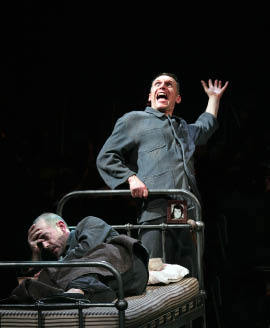Greta Garbo Came to Donegal
Tricycle
Every Good Boy Deserves Favour
Olivier
Frank McGuinness, the world’s leading supplier of Celtic Kleenex drama, is back with a variation on his favourite theme. Misery upon misery bravely borne in a green, green island long, long ago. The twist is the addition of Greta Garbo. In 1967, the wandering superstar visited McGuinness’s home town of Buncrana in Donegal. This nugget of truth is decorated with fictional frills. McGuinness billets the melancholy hermit on an invented Irish family, the Hennessys, whose house has been bought by a society painter from England. The toiling Irish underlings are thus condemned to scrub and skivvy in a mansion their ancestors once owned. Family tensions are accentuated by this daily humiliation. Money is tight, drink is plentiful, hope is fragile and short-lived. The senior family members have fallen into unbreakable patterns of behaviour. Everyone makes jokes about Sylvia, whose looks are supposed to be fading. But the running gag keeps tripping up on the concrete of reality.
Sylvia is played by Angeline Ball, a twinkly thirtysomething blonde whose manifest beauty makes nonsense of every insult and wisecrack. The arrival of Sweden’s gloomiest has-been adds very little by way of mirth or gaiety. In real life Garbo was the last thing in female mystique. Here she reinforces the notion that an ‘enigmatic’ woman (like Jackie Onassis and Kate Moss after her) is just a boring one who’s turned her limitations into a publicity angle.
McGuinness has applied his craft to the glacial Swede but not his artistry. He can’t lift her beyond a series of colorations and shadings. Gaunt, moody, distant and humourless, she’s as predictable as night following day or lager louts following darts. She’s not remotely likeable and she has an irritating, albeit credible, habit of talking about herself as if she were the secretary of her own fan club. ‘Garbo laughs!’ she exclaims after tittering at something funny. ‘Once it would have made headlines.’ The portrait is convincing but dramatically motionless. She alters, and is altered by, nothing. She arrives, she sits, she comments, she pushes off.
The play’s movement lies elsewhere, in the tale of poor brave Colette, the beautiful downtrodden youngest daughter, who dreams of studying medicine in Dublin but whose feckless, drunken parents can’t drum up the readies to pay for her tuition and who suggest teaching instead. The play wants to generate a sense of oceanic grief so we’re expected to regard Colette’s frustrations as suffering on an epic scale. Teaching, not medicine, eh? The poor kid’s got it tough. Job security, decent wages, rewarding work, 16 weeks holiday a year and a state pension. What a terrible crushing of the human spirit.
There are some decent performances in this bizarre play. Tom McKay is good as a lairy Cockney toyboy and Caroline Lagerfelt manages to bring a faint pulse of life to the Viking waxwork. By the final scenes I found myself wishing Garbo’s visa had been refused and she’d spent that summer in England next-door to Tom Stoppard.
His 1977 play Every Good Boy Deserves Favour is rarely revived because it requires a full orchestra on stage. Or so I believed. In fact, in the closing moments, the musicians exit and a prerecorded orchestra takes over. So with some imagination, and a decent soundtrack, the play could be performed on a modest budget anywhere. This is an astonishing imaginative achievement. With a score by André Previn, Stoppard has created a vision of horror and beauty underpinned by grim political truth.
Two prisoners share a cell in a jail that poses as a lunatic asylum. One is genuinely mad and believes everyone he meets is a member of his orchestra. The other is sane and has been offered a deal by the authorities. If he admits to having been ‘cured’ he will be freed. He refuses and goes on hunger strike. Unexpectedly, the prison doctor is a libertarian blessed with a streak of absurdist humour. He wants to help the dissident escape. The scenes in which they explore the contradictions of their predicament are as dazzling and delicate as anything Stoppard has written.
This is an exquisitely staged production with fine central performances. Julian Bleach plays the lunatic with judicious touches of humanity. He’s funny but never merely ridiculous. And Jonathan Aris, as the doctor, gives a wonderful account of nonchalant Varsity wit. Though the music is essential, it’s the final tableau that will remain with me. The prisoner, poised between life and death, appears in the midst of a haphazard white path which zigzags through the orchestra’s abandoned instruments towards some obscure variety of heaven. If you can, grab a chance to see this show. It’s one of the craziest scripts ever conceived: an extended dream sequence, set to music, about repression and political dissent. It shouldn’t work. It works superbly.







Comments